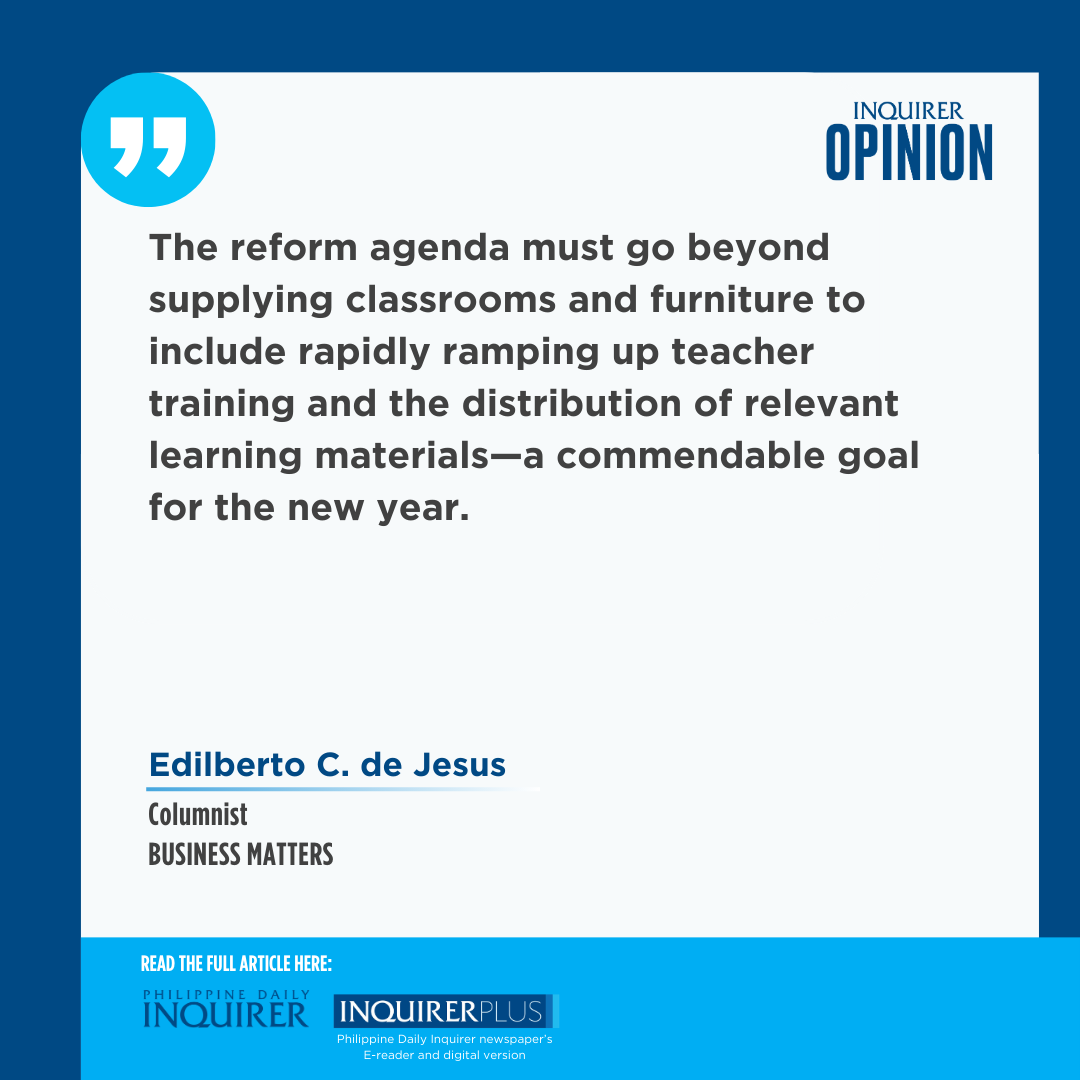A New Year mission for DepEd
The Department of Education (DepEd) begins the year facing the familiar problem of a classroom backlog. Not the fault of the new leadership, which prudently documented the starting point against which it will be measured. DepEd Secretary Sonny Angara acknowledged the need to accelerate classroom construction to prevent the estimated gap of 165,000 classroom shortage from growing wider. To meet this goal, Angara returned to the public-private partnership (PPP) strategy that DepEd had not used for over a decade.
Asean countries implementing large, complex, and costly infrastructure projects have successfully resorted to PPP. Notwithstanding the government’s reputation for competence and integrity, Singapore tapped the private sector for projects as diverse as the Changi Water Reclamation Plant and the Singapore Sports Hub for athletic and entertainment events. Indonesia, Malaysia, Thailand, Vietnam, and Indonesia have similarly used PPPs to benefit from private sector financial resources and expertise in transport, energy, and port development. Notable examples include the Central Java Power Plant, Malaysia’s Plus Highway, Bangkok’s Mass Rapid Transit network, and Vietnam’s Hai Phong International Gateway Port.
Even Brunei, with its small population and ample budgetary resources, selectively employs PPPs, as in the development of the Jerudong Park Medical Centre. The government retains ownership of the hospital while providing major financial support for its construction, facilities, and operations. But it partners with private sector health professionals and international healthcare organizations for advanced medical expertise and technologies. Appointments await those who can introduce and maintain world-class standards in the provision of training and patient management systems in cardiology, oncology, and neurology services.
Unlike the Philippines’ relatively successful PPP projects, recent examples of more conventional procurement contracts have disappointed. Various agencies, including the Department of Health, PhilHealth, the Bureau of Customs, and Department of Public Works and Highways have faced charges of irregularities in the purchase of supplies, equipment, and services in the last few years.
DepEd has had its own share of problems in the procurement of computers. Its record in classroom construction since 2020 has also exposed its need for help. Enrollment increases require 12,000 additional classrooms each year. DepEd had been able to build only 11,000 units. While constructing 9 meter by 7 meter single-story classrooms does not seem overly complex, the numbers needed recommends enlisting private sector help. Secretary Angara is taking no chances. Before year-end, he signed a $1-million Technical Assistance Agreement with the Public Private Partnership Center to support the immediate target of ramping up construction by 15,000 classrooms, quickly followed by the planned construction of up to 90,000 units to narrow the infrastructure gap. Both the Marcos Jr. administration’s preferences as well as EdCom II’s stress on public-private sector complementarity favor the PPP strategy.
The DepEd decision to focus on the classroom deficit is also strategically sound. Congested classrooms in disrepair are obvious and odious to the voting public. Opinion surveys confirm respondent discontent and demand for action to relieve the prevalent classroom congestion stressful to children. Positive agency response and accomplishments are easily recorded and credited. Politicians also love bricks-and-mortar projects that are visible and can be readily identified with them. Public support for education initiatives has played well in election campaigns, and note the quick backlash to education budget cuts.
Among DepEd’s many, deep problems, projecting and supplying the required supply of classrooms should be the easiest to accomplish. It is only a slight exaggeration to say that all this requires is money, which Congress apparently believes is in such abundant quantity that it could be lavishly allocated to perks and pork projects. But there is no denying that the lack of comfortable classrooms and basic amenities, such as toilets, light, and water, not to mention computer hardware and internet connections, does affect student learning motivation and outcomes.
Improvements in the school environment protect the health and welfare of students and teachers, who expect the schools to provide them. But these cannot ensure the teachers’ ability to help the students acquire the relevant knowledge and skills needed for their educational journey through grade school and beyond. Enabling Filipino children to meet acceptable Pisa standards in Reading, Math, and Science must remain the measure of DepEd’s performance. The reform agenda must go beyond supplying classrooms and furniture to include rapidly ramping up teacher training and the distribution of relevant learning materials—a commendable goal for the new year.
—————-
Edilberto C. de Jesus is professor emeritus at the Asian Institute of Management.
—————-
Business Matters is a project of the Makati Business Club (makatibusinessclub@mbc.com.ph).





















